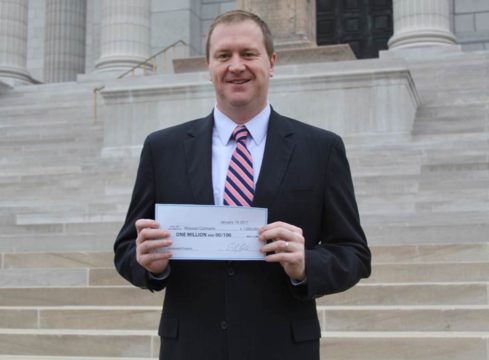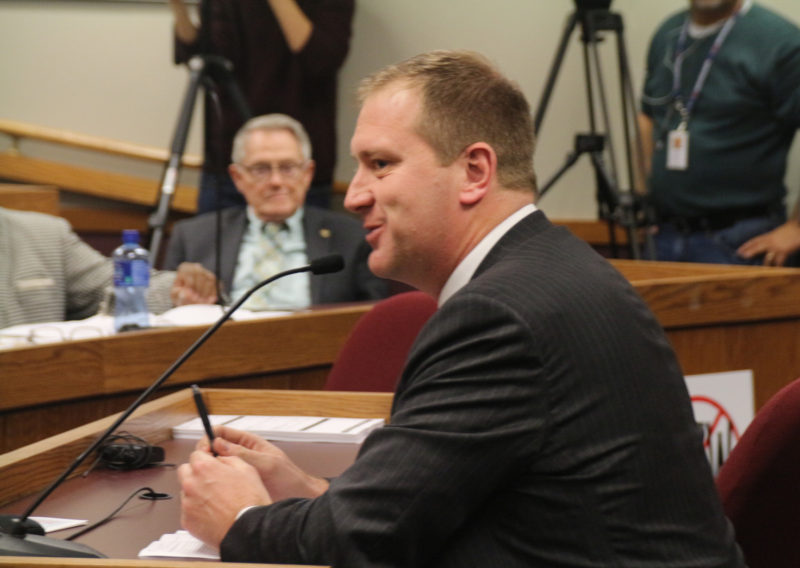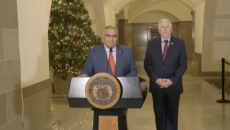JEFFERSON CITY, Mo. – Missouri’s state treasurer, Eric Schmitt, is no rookie when it comes to the legislative session, and though the former senator is no longer serving in the chamber, his influence has been felt in the business of the Missouri General Assembly this year.

Schmitt has quickly taken to his new role as treasurer, easily setting a new record by returning $1 million in unclaimed property in his first 11 days. Since then, he’s returned a total of $13 million in unclaimed property and issued nearly two million payments and checks, while earning more than $7 million in interest on the state’s investment portfolio.
All of that, on its own, would be significant accomplishments for the state’s chief financial officer, but for Schmitt, that’s the just the start.
“As chief financial officer, it really allows you to have a longer-term view of the state’s finances and economy, to see what those challenges and opportunities are,” he said.
Since taking office in January, he’s been vocal in his support of various pieces legislation, taking the time to testify in various committees on several issues, including right-to-work, while also pushing forward with his own agenda. That agenda is to put the state in the best financial position it can be, and in the process, it’s giving him the opportunity to sign off on some of the things he’s spent years working on and advocating for. It’s unfinished business for both him and the state.
One could argue that Schmitt’s vocal stance on fixing Missouri’s pension system helped push that effort to the finish line. Schmitt was serving as a senator when the chamber first took up some pension-related legislation in 2010, and now, seven years later, the treasurer called on the legislators to do something about what he referred to as the “single greatest threat to the state’s perfect AAA credit rating.” He warned that if not acted upon soon, it could mean fewer resources for schools, roads and health services later on.
“It’s the largest pension fund in the state, and early on, we penned an op-ed about this looming crisis, this gathering storm on the horizon, and it’s very real,” he said.
Schmitt discussed how the state was only 64 percent funded, which he says is assuming a couple of things.
“One, it assumes that our rate of return in is eight percent, and we don’t get that rate of return. Once we ratchet that down to a closer number to where we should be, that underfunded nature is exacerbated, and then we also assume that people are living shorter lives than they really do. And when you plug all of those numbers in, the problem is much more severe than a lot of people have indicated.”
Schmitt is a member of the MOSERS Board of Trustees and applauded the General Assembly’s passage of legislation of pension reform in SB 62, which authorizes MOSERS to offer voluntary advances on benefits packages to eligible employees who are no longer working in state government.
“Earlier this year, I called on the Missouri General Assembly to pass an advanced benefits reform package in order to reduce the fiscal burden of our state’s troubled pension system,” Schmitt said in a statement issued after the General Assembly passed the bill. “I applaud the legislature for answering that call last night and taking this important first step toward shrinking the size of our pension problem through smart, fiscally conservative reforms.”
In addition to that, he says they have been working to get more people enrolled in the college savings program.
“We can do a lot better as a state,” he said. “If a college savings account is opened for a child, they are six times more likely to go to college, and we know this, so we’re working really hard with our team to get there.”
Schmitt has also been quick in his efforts to provide relief to those affected by disaster, approving programs to those affected by severe storms and flooding this spring with as much haste as any response.
But his real crowning achievement this session has been the successful establishing of the Missouri Achieving a Better Life (MO ABLE) program.
The program will allow families and individuals with either physical or mental disabilities to set up designated savings accounts to pay for expenses related to their special needs. The savings accounts are used to help pay for the long-term needs of those with disabilities, alleviating families of the unique financial stresses that can come along with having a disabled child.
It’s been a project of his for quite some time, as he carried and passed legislation to enable the ABLE Act in Missouri when he was a senator. The law was signed by then Gov. Jay Nixon in 2015.
The idea for MO ABLE came from the 529 college savings plans created by the federal government in the early 1990s. Any money contributed to those accounts became tax deductible, and any interest gained on those accounts was not taxed as well. MO ABLE essentially does the same thing for individuals with disabilities.
Schmitt’s own son suffers from epilepsy and autism, so he knows personally how important a plan like this can be.
“As the father of a child living with special needs, working on a lot of those issues in the Senate and sponsoring that legislation while I was there… to be able to the state treasurer at the time in which we’re rolling that out is an incredible honor, and I’m very grateful,” Schmitt said. “We’re working very hard to be the national leader in this particular program.”
And during the legislative session this year, he joined a new partnership with several other states to expand the ABLE program to make it more accessible.
Schmitt says the program will be a major help to the 800,000-plus Missourians who live with disabilities, and he believes it “gives a lot of hope to families across the state.”
While Schmitt still has yet to reach his first six months in office, he says they still have much left to do, and says that it can only be accomplished with the hard work of the team he has assembled.
“You can’t do this by yourself. We’re going to be very active, and we’ve got a lot do,” he said. “Anything that we can do for every Missourian to have great opportunities here, we’re going to jump in and do whatever we can to fight for those priorities.”
Benjamin Peters was a reporter for The Missouri Times and Missouri Times Magazine and also produced the #MoLeg Podcast. He joined The Missouri Times in 2016 after working as a sports editor and TV news producer in mid-Missouri. Benjamin is a graduate of Missouri State University in Springfield.








